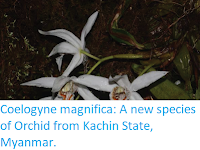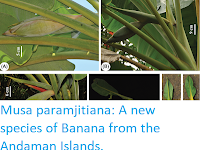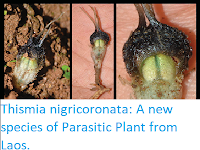The genus Tupistra comprises about 27 species of Lily-like herbaceous Monocots closely related to Aspadistras, found across the Himalayan region, India, China, and Southeast Asia. They are rhizomatous plants (plants with a persistent, fleshy, creeping root, which produces stems, leaves and flowers during a growing season, then dies back to the root out of season), that often grow as lithphytes (i.e. on exposed rock faces).
In a paper published in the journal Taiwania on 11 July 2017, Dilip Kumar Roy and Ashiho Mao of the Eastern Regional Centre of the Botanical Survey of India, and Leonid Averyanov of the Komarov Botanical Institute of the Russian Academy of Science, describe a new species of Tupistra from the East Khasi Hills of Meghalaya State in India.
The new species is named Tupistra khasiana, in honour of the Khasi people of the Khasi Hills of Meghalaya State, for their contributions to the preservation of the biodiversity of the region, through the preservation of sacred groves. The species is a lithophytic perennial herb producing leaves up to 50 cm in length, producing purple and green flowers in October and December.
Tupistra khasiana. (A) Habit. (B) & (C) Rhizomatous stem with inflorescence. (D) Inflorescence. (E) Bract. (F) Bracteole. (G) Flower, side view. (H) Sagittal section of flower. (I) Flattened perianth, adaxial surface with stamens. (J) Flattened perianth, abaxial surface. (K) Anther. (L) Pistil. (M) Ovary, side view. (N) Ovary, transversal section. Roy et al. (2017).
See also...
Follow Sciency Thoughts on Facebook.







